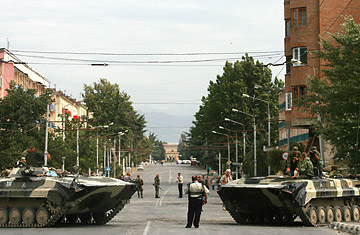
Russian soldiers man their tanks at a checkpoint in Gori, Georgia
A Russian tank squats across the main road heading into the town of Gori, its turret pointing east toward the capital, Tbilisi. Three armored personnel carriers seal off the rest of the thruway; one churns up the asphalt and repositions itself in the bushes. A handful of Russian special forces crouch next to their rocket propelled grenade launchers and eye the Georgian positions a few hundred yards away. In the valley behind the Russian units, in Gori itself, a column of thick black smoke billows skyward.
"We are peacekeepers," explains Russian Sergeant Vasili Schevchenko, from Stavropol, dragging on a cigarette and eyeing the aid workers and journalists wanting to get through. "All we want is peace." He does not know what is causing the big plume of smoke in Gori, he says. When will the Russians pull back? "We are just taking orders," he growls.
The road to Gori — which is also the main artery linking Black Sea ports in west Georgia with the capital and points east, and which has been cut since the weekend — was supposed to have been clear on Wednesday, following a cease-fire between Russian and Georgian forces on Tuesday. The Georgian government announced its opening last night. U.S. Secretary of State Condoleezza Rice had planned to visit the town tomorrow, taking this road. But earlier today it remained cut off by Russian troops. Georgians, even senior politicians, as well as aid workers and journalists, were being turned back, reflecting ongoing confusion about the state of the cease-fire.
Behind the lines, meanwhile, in territory still nominally under Russian control, reports are emerging of widespread looting and some killings by Ossetian civilians, much of it directed at Georgians. Georgian soldiers and some refugees also allege that civilians from Russia, including Cossacks and Chechens, are flooding into areas that remain under Russian military control to take advantage of the lawlessness.
Robizon Etgadashvili, 57, left his village of Kareleti, five miles from Gori, three days ago after looters whom he didn't recognize began ransacking the village and carting away possessions in stolen cars. They took TVs, rugs, even windows and doors. "I said to four men who came into my house, 'Take what you want,' and they said, 'We don't have to ask you, it is ours,' " said the farmer, who was walking the road to Tbilisi 80 km (50 miles) away. "When the Russian army goes, the Ossetians come and take everything." A neighbor and grandfather who was sitting in the street when the looters came raised his arm and was shot dead. "We could not bury him," Maria Kharbegashvili, 49, says. Her harvest of apples and peaches will rot on the trees. "We are poor now! Nobody thinks about us. They play big politics, but nobody cares about ordinary people."
Even the governor of Gori was barred from returning to his town today. Waiting at a police checkpoint in his black Toyota Land Cruiser some 48 km (30 miles) from Gori, he said the Georgian government ordered him to leave yesterday for his own security after looters overran the town, ransacking his home and office. He said that, according to his sources, local Ossetians are urging Russian troops to stay. "They (Ossetians) don't want to be exposed (to retribution)," said the governor, Vladimir Vardzelashvili, 29.
Meanwhile, less than 100 m (about 300 ft.) from Russian positions outside Gori, Georgian special forces are dug in, waiting to move back into the city. Goga Gegenava is a special forces lieutenant, suited up with Russian- and Austrian-made weapons and American protective gear. He says they have reports of 4,000 Russian troops still in Georgian territory. "They are doing what they want. We have no control," he says, shrugging. "They have tanks, bombs, jets. We Georgians can't do anything about this." Behind him a winding column of thousands of Georgian troops and artillery units is nevertheless making its way toward Gori in the hopes that the line will soon be opened. Whether they — or anyone else — gets through anytime soon, says Gegenava, "is up to Russia."